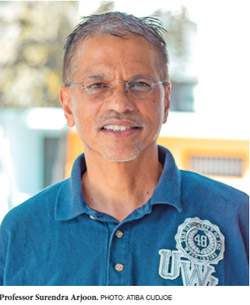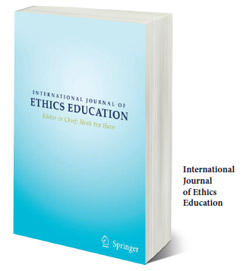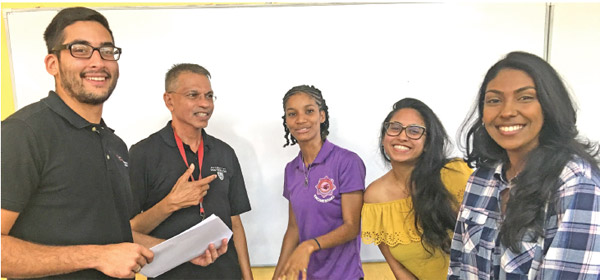 |
 |
 |
|
August 2019 |
“It’s not something I would have ordinarily gravitated to,” says 23-year-old Zakiyah Rocke, an Applied Psychology student going into her second year at UWI St Augustine. Then, last year she attended the seminar course “Caribbean Ethics and Professional Practice”. The teacher was Professor Surendra Arjoon. “To me it was a breath of fresh air, not only because of his personality but his approach to teaching,” Zakiyah said. “It wasn’t the traditional classroom setting where you come prepared to take notes and you feel anxious to contribute. You come, you learn, you share. Professor Arjoon is open to learning our different perspectives.” That “approach to teaching” is no accident. Arjoon, a Professor of Business and Professional Ethics in the Department of Management Studies at the St Augustine Campus, has worked for years with colleagues to develop and refine a truly innovative approach to teaching and learning ethics. The key to that approach is humility. “Although it is not considered the most important virtue, from both a theoretical and practical perspective, without humility, one cannot acquire and practice the other virtues,” he says. “In other words, humility ‘serves’ and can be considered the ‘light-switch’ for the other virtues. One cannot acquire and practice compassion, forgiveness, effective leadership or even faith without this foundational virtue of humility.” And these virtues matter enormously when learning ethics and applying them to our lives. This “humility-embedded” approach received international recognition earlier this year in the International Journal of Ethics Education. Professor Arjoon and his colleague Dr Meena Rambocus (Lecturer in the Management Studies Department) wrote an article that was published in the journal entitled “Exploring the relationship between humility and the virtues: toward improving the effectiveness of ethics education”. “There have been several recent innovations on improving the effectiveness of ethics education in business schools, most of these efforts lack measurable learning outcomes,” the researchers said. “As such, it is challenging to assess the effectiveness of such teaching and learning interventions and whether they are achieving their desired outcomes.” In the early 2000s, US-based energy company Enron was exposed in a massive scandal that even today is pointed to as the case-study for ethical failure in business. However, even as institutions developed scholarship and training in ethics following the scandal, since then there have been numerous examples of unethical practices in the corporate world and beyond. “In a 2014 Bloomberg report, author and educator Deborrah Himsel noted that business schools have made efforts to teach students to carry out ethical lessons from their MBA programme into the working world and to behave ethically as professionals, however, such programmes often fail to contribute to an ethical business climate because the teachings of the classroom are no match for the harsh realities of the global workplace,” Professor Arjoon states. The feedback from Professor Arjoon’s students about his approach has been very positive.
“Professor Arjoon has been an inspiration with his teaching on ethics and his outlook on life,” says Shenelle Rambhajan. “He emphasised the importance of being ethical and understanding of individuals; not judging them but looking at the situation holistically.” Most pointedly, Shenelle says, he is “respected not only for his academic achievements but for his humility.” “There is certainly no disagreement about the role and importance of humility, which has now been emerging as a critical research topic for effective leadership and building an effective organisational culture,” the Professor says. He gives the definition of humility as the ability to realistically assess and operate within one’s own limitations and strengths (physical, moral and psychological). Achieving it however, is easier said than done. “Unlike the other moral virtues, humility is distinctly difficult to acquire. To develop humility requires the continuous practice of acquiring self-knowledge, sincerity, openness to new ideas and feedback,” Professor Arjoon says, pointing to actions like “putting the needs of others first, appreciating the strengths and contributions of others, admitting mistakes and correcting one’s behaviour, avoiding speaking unnecessarily about oneself, not judging others, not seeking to be the centre of attention or not thinking yourself better than others.” In modern life these are rare attributes indeed. At the top of our social hierarchies they are rarer still. When asked about the modern condition of moral and ethical decline, Professor Arjoon pointed to his students, who have embraced his teachings with an incredible level of enthusiasm: “Students from various departments and disciplines (mathematics, physics, life sciences, sociology, communications, psychology, law, environmental studies, and economics) throughout the University participate in this oversubscribed Professional Ethics course.” Taalia Hassanali, a final year law student says, “This has been the most enlightening, mind and life changing course I have ever taken during my degree. It allowed me to engage in deep self-reflection and learn about my moral strengths and weaknesses in order to become a more morally-competent person. I have not only become a more responsible and forgiving person, but most notably, the course has taught me the importance of embracing the only true purpose in life, that is, to love. Only by living a life filled with love – loving who I am and loving others despite how they have treated me – can I be internally free and at peace with myself and be fulfilled.” If young people like this are one day making decisions for our society, maybe we can look forward to an ethical tomorrow. |



 Ethics are “moral principles that govern behaviour”, says the Oxford Dictionary. It’s a weighty subject matter, some might even say outdated in this age of loud personalities and low character.
Ethics are “moral principles that govern behaviour”, says the Oxford Dictionary. It’s a weighty subject matter, some might even say outdated in this age of loud personalities and low character.  “Many educators are afraid to love and care and as a consequence, cannot bring themselves to the same level as their students. Professor Arjoon is an amazing teacher because he genuinely cares and loves and mostly because he still sees himself as a student,” says Patrice Augustine.
“Many educators are afraid to love and care and as a consequence, cannot bring themselves to the same level as their students. Professor Arjoon is an amazing teacher because he genuinely cares and loves and mostly because he still sees himself as a student,” says Patrice Augustine.